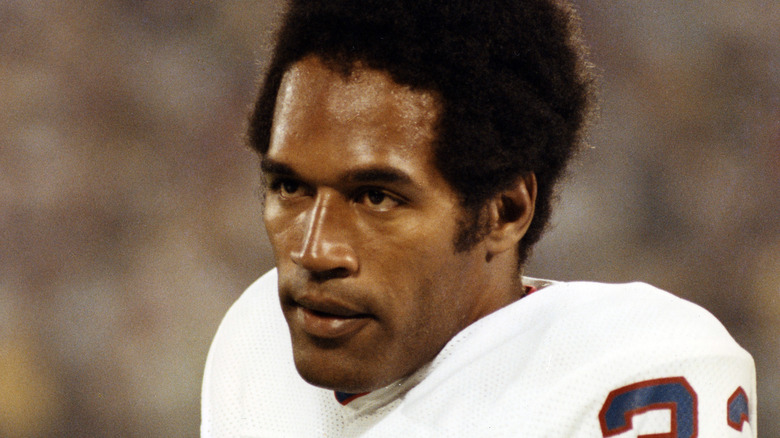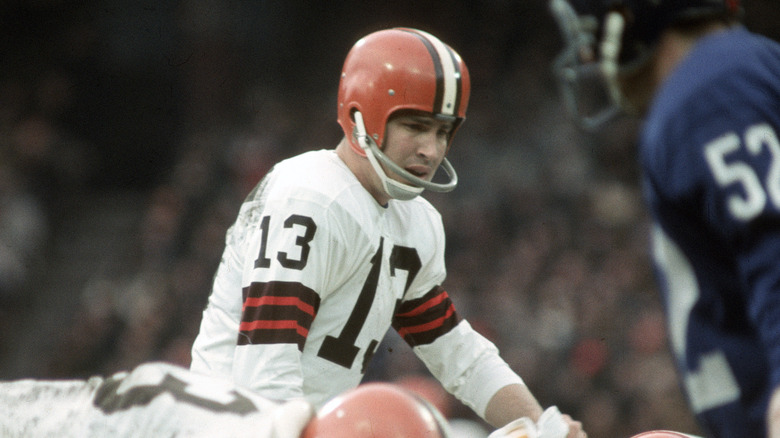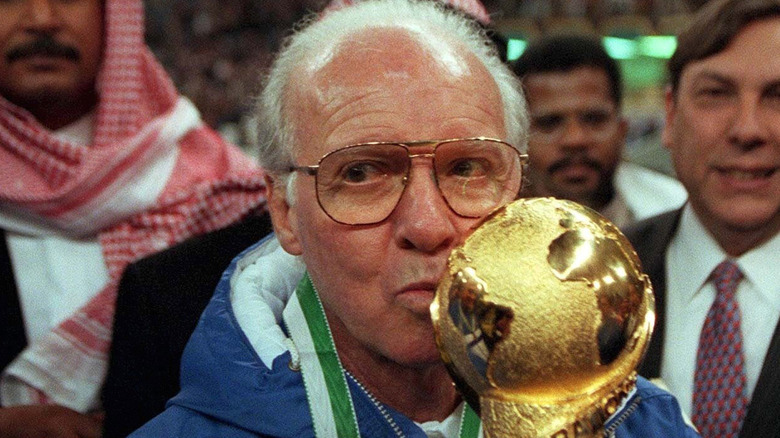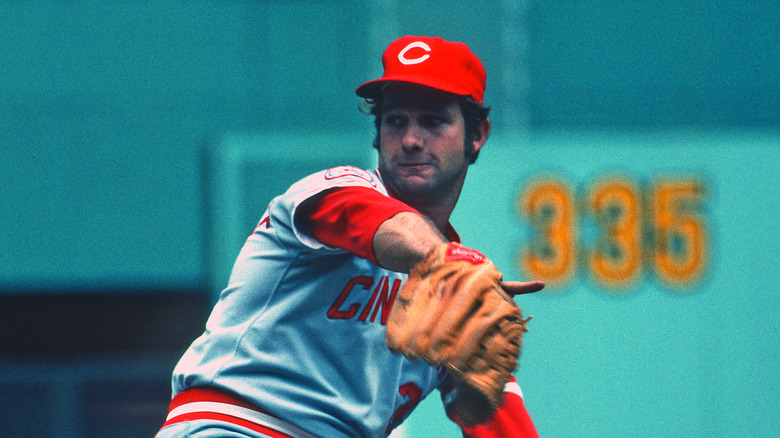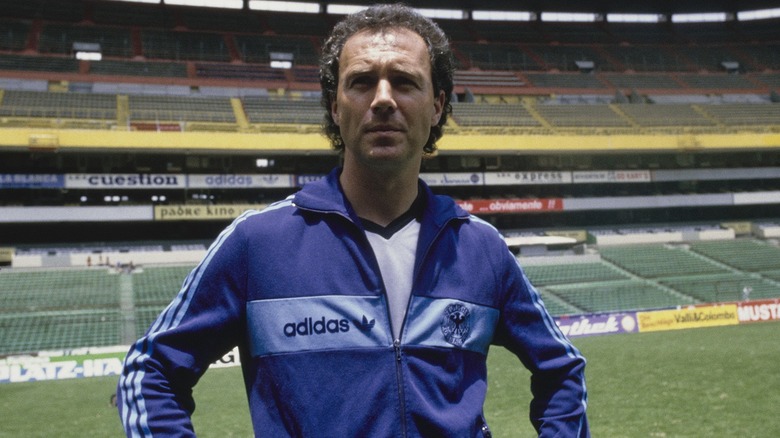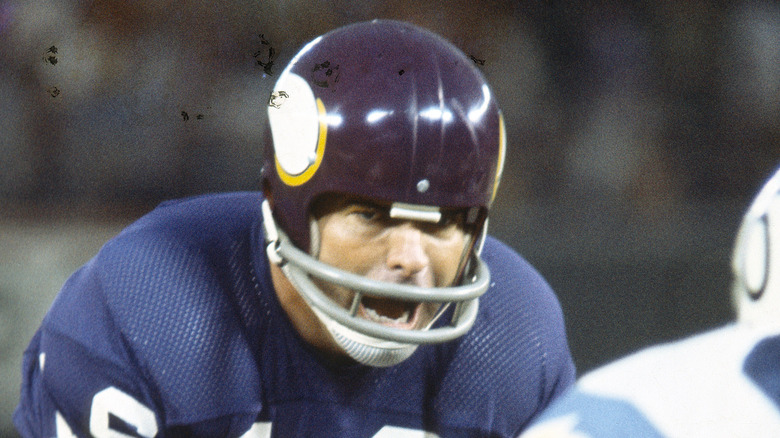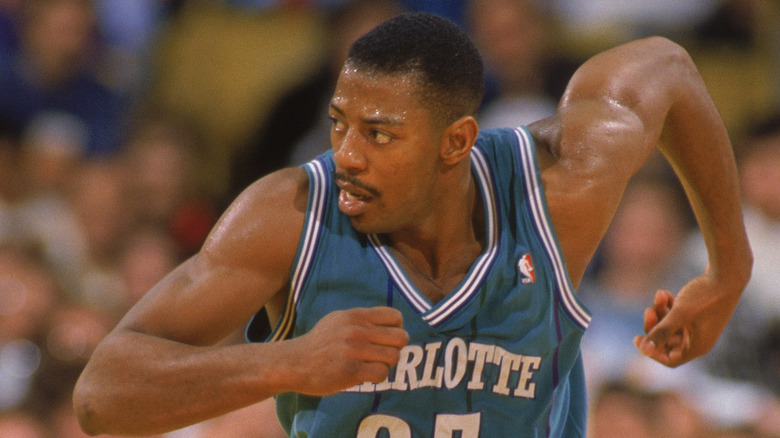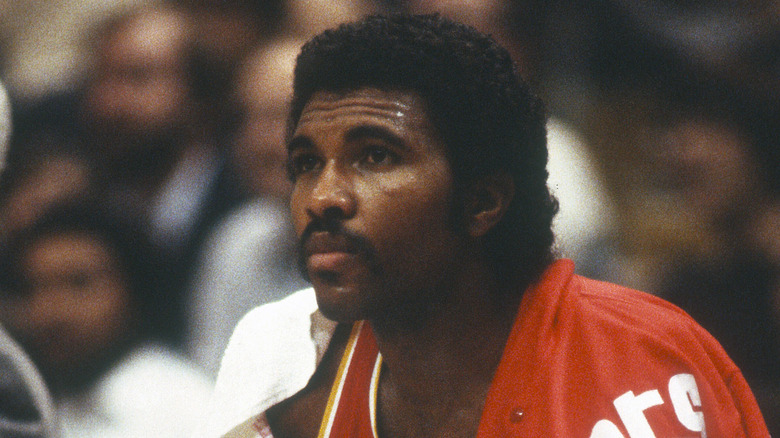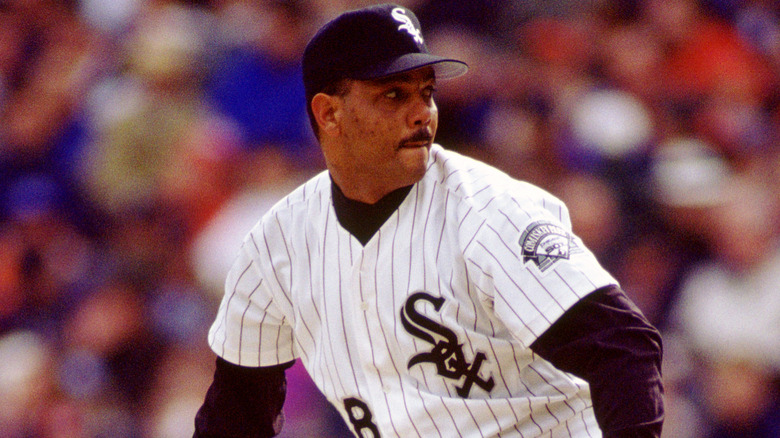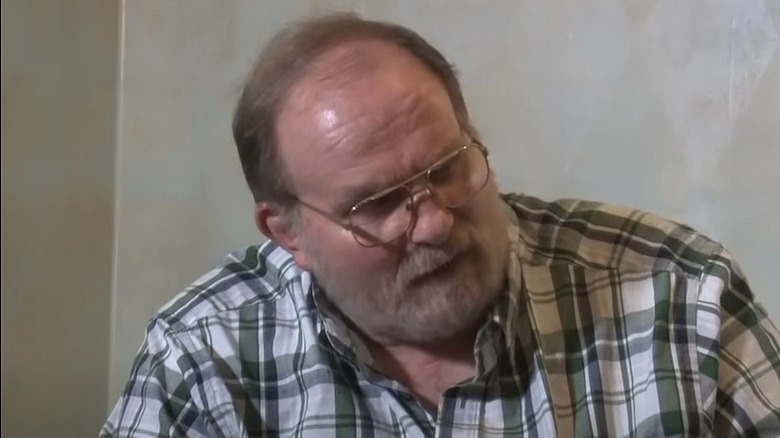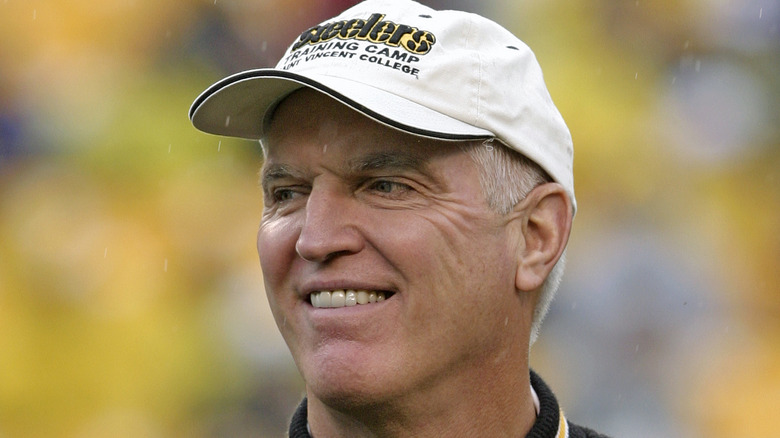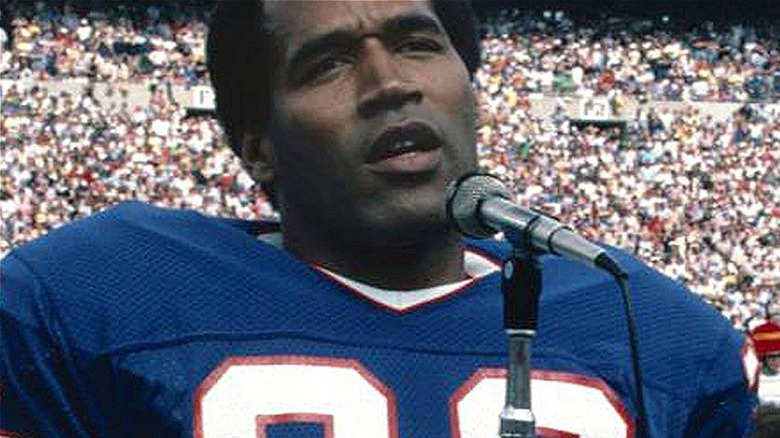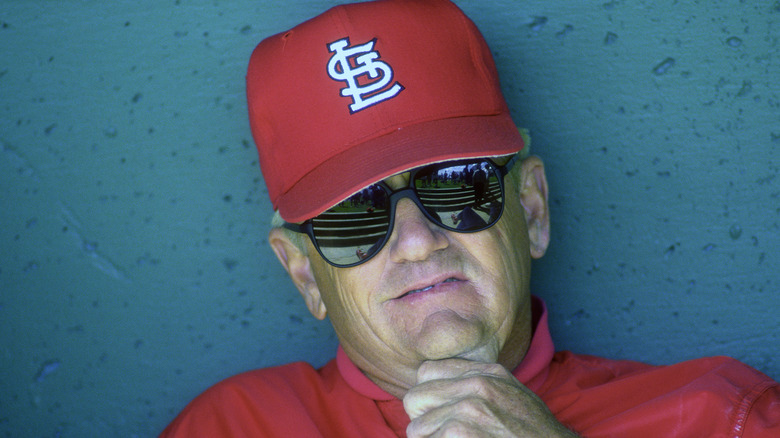Athletes Who Have Died In 2024 So Far
Professional and prominent athletes accomplish exceptional feats of strength and physical aptitude that the vast majority of us are just not capable of, and they live among us as superheroes. By being really good at certain, popular sports, athletes quickly attain unrivaled fame, adulation, and fortune. They're forever embraced by fans with goodwill and celebration, even if their lives outside of the competitive realm prove seedy or disappointing. For entertaining and inspiring others with their successes, skills, and natural greatness, it seems like they're not subject to the physical laws of the universe, as if they'll live forever.
They don't, of course. Their bodies are trained to do things that reach the limit of what's humanly possible, like setting sports records that may never get broken. But athletes are mortal, and they're subject to the same laws of nature that affect everyone. Time marches on, and everybody dies — even big-time sports stars. The year 2024 has been marked already with the loss of numerous athletic figures. Here are the all-time greats the sports community, and the world at large, lost in 2024.
Frank Ryan
Frank Ryan's football career began with an undistinguished run as the backup quarterback at Rice University — playing behind star King Hill, Ryan threw one touchdown pass in a 1958 Cotton Bowl blowout loss. A fifth-round draft selection by the Los Angeles Rams, Ryan played for the Rams off-and-on while pursuing a master's degree in mathematics. His 13-year NFL career would take off when he'd join the Cleveland Browns and take over for injured star Jim Ninowski. In 1964, he'd lead the team to an NFL championship with three touchdown passes in the title game, and six months later, he secured his doctorate from Rice. While still playing for the Browns, who reached the 1965 NFL championship, Ryan taught math at what's now Case Western Reserve University, and after his football days — which included 149 passing touchdowns, three Pro Bowl appearances, and more than 16,000 passing yards — ended, he taught at Yale and Rice, and became the director of information systems for the U.S. House of Representatives. Among his achievements there: He introduced electronic voting and computers to Congress.
On January 1, 2024, Ryan died at a medical institution in Connecticut from complications relating to an Alzheimer's disease diagnosis. One of the greatest football players to never appear in a Super Bowl, the retired athlete and mathematics professor was 87 years old.
Mario Zagallo
Raised in Rio de Janeiro, Brazilian soccer star Mario Zagallo first played professionally as a teenager with the America squad, one of his metropolis' major teams. He'd then join Flamengo, and the left wing would participate in three Carioca state championships. But Zagallo would become a legend for his decades-long work in various capacities with the Brazilian national team. As a player and coach, he won a total of four FIFA World Cups, the most of any individual in soccer history. He was a starter on Brazil's 1958 World Cup-securing team, and he resumed that role in the 1962 global championship tournament. Zagallo stayed on with the dynastic Brazilian squad, a team responsible for some of the wildest World Cup moments in history, signing on as a coach in 1970, when the Pelé-starring team won another World Cup. When Brazil won a fourth title in 1994, Zagallo was there, too, as an assistant coach.
On January 5, 2024, Zagallo died in Rio de Janeiro at the age of 92. FIFA president Gianni Infantino called Zagallo's presence "unparalleled," according to Reuters. Such was his importance to his country's history, culture, and sports that Brazi's President Luiz Inacio Lula da Silva called for a three-day national mourning period in honor of Zagallo.
Don Gullett
A outstanding multiple sport athlete who'd already earned a statewide following around Kentucky as a teenager, high school star Don Gullett entertained more than a dozen basketball scholarship offers and 35 football program recruiters, and enjoyed speculation that he'd go first in the 1969 Major League Baseball draft upon his graduation. Gullett ultimately chose baseball, where the Cincinnati Reds drafted him 14th overall. Armed with one of the speediest fastballs in the big leagues at the time, Gullett pitched for nine seasons, the first seven with the Cincinnati Reds and the last two with the New York Yankees. In 1974 and 1975, with 17 and 15 wins, respectively, he'd finish among the top vote-getters for the pitchers-honoring Cy Young Award.
Health problems would hamper and curb Gullett's baseball days, but he'd still finish with 109 wins and nearly 1,000 strikeouts. As part of two historic '70s teams, he'd win a total of four straight World Series, two with Cincinnati's "Big Red Machine" and another two with the Yankees. Following a period of medical issues, Gullett died on February 14, 2024. He was 73 years old.
Franz Beckenbauer
Playing central defense for German professional teams and the West German national team in the 1960s and 1970s, Franz Beckenbauer became his country's definitive soccer star of the 20th century. Nicknamed "Der Kaiser" for his respectable dominance of the game in Germany, Beckenbauer turned professional as a teenager with Bayern Munich, and in a 14-year career he led his team to four league championships, three all-Europe titles, and the Intercontinental Cup. Twice he earned the Ballon d'Or, awarded to the top overall player in Europe, and he's still the only defender to win it in multiple seasons. He capped that illustrious career by lending some credibility and talent to the fledgling North American Soccer League in the 1970s, winning three championships with the New York Cosmos.
Beckenbauer was arguably even more successful in international play. He participated in 103 matches for the West German team, and after losing two World Cups in 1966 and 1970, he captained the squad to a 1974 win. Out of duty and national pride, Beckenbauer agreed to coach the West German team in the '80s, where he won the 1990 World Cup. He'd also lead the drive to soccer governing body FIFA allowing Germany to host the 2006 World Cup.
Following a period of declining health, including a heart bypass operation, Beckenbauer died on January 7, 2024, at age 78.
Norm Snead
Before the NFL and AFL merged, and then into the Super Bowl era, Norm Snead ranked among professional football's top quarterbacks. A multiple ACC-record-setting prospect out of Wake Forest University, Snead was drafted by Washington's NFL team as the no. 2 pick in the 1961 draft, and he'd finish in fifth place in the Rookie of the Year vote at the beginning of a career where he'd be named to four Pro Bowls.
Year after year, he put up huge numbers in touchdowns and total yardage, but unfortunately for Snead, he had a knack for landing the starting quarterback position on some of the era's worst teams. His squads compiled a record of 52-100-7, and he never took Washington, the Philadelphia Eagles, the Minnesota Vikings, or the New York Giants to the playoffs. But in 1965, he recorded 15 touchdowns and 2,346 yards, and in 1972, he'd amass 17 touchdowns and 2,307 yards. Snead played in every game of his 16-season career, including a 61-to-10 win for the Giants over the Philadelphia Eagles in 1972 — still the franchise's biggest win ever.
On January 14, 2024, Snead died in Naples, Florida. The football legend was 84 years old.
Earl Cureton
Earl "The Twirl" Cureton is a Detroit sports legend, successful at every level of basketball he played in the city. He was a dominant star at Detroit Finney High School, then at the University of Detroit, and with the Detroit Pistons, too. Picked in the third round of the 1979 draft, Cureton would suit up for the Philadelphia 76ers, Chicago Bulls, Los Angeles Clippers, Charlotte Hornets, Houston Rockets, and the Toronto Raptors across 12 seasons, along with professional stints in Italy, France, Mexico, and Argentina. A solid, if undersized (6'9") backup center and power forward, Cureton defended his way to two NBA titles, in 1983 with Philadelphia and in 1994 with Houston. But some of his best performances would come during his three seasons with his hometown Pistons, with whom he'd serve as a broadcaster after his retirement from playing. Cureton would make an impact in the WNBA as well, joining the Charlotte Sting, Phoenix Mercury, and Detroit Shock as an assistant coach.
On February 4, 2024, Cureton reportedly collapsed at his home in Detroit and later died. He was 66 years old.
Robert Reid
In the Lakers and Celtics-dominated NBA playoffs of the 1980s, the Houston Rockets broke through to the Finals twice, in 1981 and 1986. A big reason for that franchise's success in that time was the consistent, intimidating play of two-way utility player Robert Reid, a small forward and shooting guard. Reid spent 10 seasons of his 13-season career with the Rockets, followed by short stints with the Charlotte Hornets, Portland Trail Blazers, and Philadelphia 76ers, playing about 1,000 games and averaging a respectable 11.4 points, 4.5 rebounds, and 1.3 steals. Reid's career is notable for a season-long absence. His temporary retirement proved newsworthy and controversial — Reid skipped the Rockets' 1982-83 campaign, and a $300,000 paycheck, when he worried that the professional athlete lifestyle led him to make poor choices that conflicted with his religious convictions.
Reid retired after the 1990-91 season and settled in Houston. On February 19, 2024, according to his family, Reid died at home after being treated for cancer. He was 68 years old.
Jose DeLeon
Drafted by the Pittsburgh Pirates in 1979 and developed in its minor league system, Dominican Republic-born pitcher José DeLeon showed huge promise in his first big-league season in 1983. He earned some National League Rookie of the Year votes after posting a 2.83 ERA with seven wins and three losses. By the time he'd wrap up a 13-year career in 1995 after stops with the Chicago White Sox, St. Louis Cardinals, Philadelphia Phillies, and Montreal Expos, he'd established himself as a strikeout king, with 1,594 total and a strike-to-walk ratio of 1.9. He even led the NL in 1989 with 201 strikeouts. But DeLeon kept landing on teams that weren't very good offensively, leaving the pitcher with a career win-loss record of 86 and 119; he led the National League in losses twice — 19 each in 1985 and 1990.
DeLeon returned to the Dominican Republic after his MLB days were over and participated in winter league baseball there. On February 26, 2024, his team announced that the pitcher had died at Cedimat Hospital in Santo Domingo. DeLeon was 63 years old.
Ole Anderson
Following a period in the U.S. Army, Alan Robert Rogowski adopted the ring name Ole Anderson and started his journey to wrestling stardom in the late 1960s. The first major promotion where he participated was the Carolina-based NWA, where he teamed up with Gene Anderson and, pretending to be brothers, won a tag team title as the Minnesota Wrecking Crew. Following some more work in small wrestling circuits in the South, Anderson joined the WWE, at the time known as the WWF, in its flashy, highly lucrative 1980s era. In the most visible wrestling company in the U.S., Anderson teamed up with stars like Ric Flair and Tully Blanchard to form a collective called the Four Horsemen, which helped establish the concept of "stables" in the WWF. Anderson retired from wrestling in the 1990s and went to work for the WWF's rival organization, the WCW, as a booker.
Anderson died on February 26, 2024, at his Monroe, Georgia, home. He was 81.
Andy Russell
The Pittsburgh Steelers dominated the NFL in the 1970s with an imposing defensive line, and two of its Super Bowl victories can be attributed to the addition of linebacker Andy Russell. A college star at the University of Missouri and drafted in 1963, Russell intended to play just one year to make a bit of money and then return to school and work toward a master's degree in business administration. When Steelers star John Reger went down with an injury, a regular roster spot opened up and Russell stayed for 12 years, not counting his two-season break to serve in the military as part of his collegiate ROTC commitment. With 38 regular-season sacks and 18 interceptions, and three sacks and a pick in 11 playoff games, Russell helped make the Steelers a perennial contender. For his efforts, he was named a Pro Bowler seven times, and in 1971, the Steelers selected Russell a captain for 10 seasons and chose him as its team MVP, over the likes of superstars "Mean" Joe Greene and Terry Bradshaw.
In addition to his football success, Russell was an accomplished climber, scaling all 54 tall mounts in Colorado, and a writer, publishing three books. He died on March 2, 2024, at the age of 82.
O.J. Simpson
While a horrific double-murder and extremely ugly legal issues would overshadow his football accomplishments, O.J. Simpson was a tremendously skilled running back. Simpson went to the Buffalo Bills in the 1969 NFL/AFL draft at No. 1. In an 11-season, Pro Football Hall of Fame-worthy career, Simpson was named to six Pro Bowls and compiled 14,368 yards. In 1973, Simpson secured the NFL's MVP award after rushing for more than 2,000 yards — the first time a back had ever done that. His 143.1 yards per game mark from that campaign is still a league record.
Simpson's celebrity superseded football, and after he retired from playing in 1979, he moved into sports broadcasting and focused on acting, notably starring in "The Naked Gun" and its two sequels. Simpson's popularity came to an abrupt end in 1994. After his ex-wife, Nicole Brown Simpson, and her friend Ronald Goldman were discovered brutally stabbed to death, Simpson, previously accused of domestic abuse, led Los Angeles police in a low-speed highway chase before he was arrested. The subject of a high-profile, televised murder case, Simpson was controversially acquitted despite a preponderance of evidence. O.J. Simpson's life after his infamous murder trial included a civil suit that found him liable for the deaths of Brown Simpson and Goldman, and a prison sentence for armed robbery. Simpson's health declined rapidly in his final days, and he died on April 10, 2024, of cancer. He was 76.
Whitey Herzog
A decent outfielder and first baseman often utilized as a pinch hitter, Norman Herzog joined the New York Yankees organization in the mid-1950s. He lost a spot in the lineup to future superstar Mickey Mantle, but would earn the lasting nickname "Whitey" because he resembled Yankees pitcher Bob "The White Cat" Kuzava. After eight seasons with time spent on the rosters for the Washington Senators, Kansas City Athletics, Baltimore Orioles, and Detroit Tigers, Herzog retired with mediocre statistics: a .257 batting average, 172 runs batted in, and 414 hits.
But he had a good mind for the game and bounced around Major League Baseball as a scout, coach, director of player development, and manager. After securing three American League West division titles for the Kansas City Royals in the late 1970s, Herzog agreed to manage the St. Louis Cardinals in 1980 and returned the franchise to its former place as one of baseball's most storied teams. With a strategy built around strong pitchers and defensive players, Herzog's Cardinals won three National League titles as well as the 1982 World Series. Over an 18-year managerial career, Herzog won 1,281 games and was inducted into the National Baseball Hall of Fame in 2010. On April 15, 2024, Herzog died at the age of 92.
